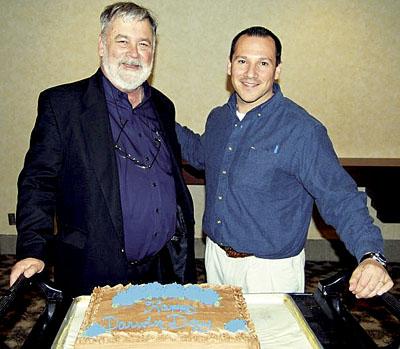said Nils Aldgridge, a paleontologist at the American Museum of Natural History in New York, and curator of the 2005 Darwin Around the World exhibit in a lecture he gave at the State University of New York at New Paltz

Eldridge, a paleontologist at the American Museum of Natural History in New York and curator of the Darwin Around the World exhibit since 2004, visited the State University of New York at New Paltz on the occasion of Charles Darwin's 201st birthday and lectured on how Darwin arrived at the theory of evolution and the consequences of this move .
During the lecture, Eldridge explained that Darwin remains relevant because his work forced listeners to rethink the answers to questions such as 'Who am I?' 'Where did I come from?' How do I fit into the world?', questions that our society still faces. said.
Eldridge described Darwin's work as "an instructive example of how people do scientific work." Most of the lecture focused on Darwin's early work and his life aboard the Beagle. "The common narrative about Darwin focuses on his journey to the Galapagos Islands," said Glenn Gehr, director of the Department of Evolutionary Studies at New York University in New Paltz. However, Eldridge's lecture focused on other parts of the journey - on the observations that Darwin made in South America and from which he gained insights.
After Darwin completed his studies at Cambridge in 1831, he was invited to serve as an unpaid naturalist on the ship Beagle on a voyage to map the coastal region of South America, Eldridge said. Despite being prone to seasickness, Darwin accepted the task.
Eldridge, who read Darwin's diary and the letters he sent from the trip, said that early in the trip he compared fossils to animals living today, and learned about the biodiversity in the rainforests of the Atlantic coast of South America. After the team literally "captured" four natives in the Land of Fire, they tried to use the method on the four natives as well. The lesson he learned was that no matter what the racial difference between people is, all human beings are "basically similar".
From Darwin's comments it seems that the seeds of the theory of evolution were sown when Darwin compared fossils of an extinct species of rabbit with a modern rabbit in Patagonia and determined that they belonged to the same species. Eldridge said he proved that there were no living relatives left of an animal that became extinct at the same time. Near Bahia Blanca, in the mid-19s, Darwin studied more fossils and found bones of an extinct Glyptodon, which he linked to the modern armadillo, as well as an extinct giant sloth, which he linked to today's modern sloth.
The idea was further solidified in 1835 when Darwin toured the Galapagos Islands and saw how the birds split into different species and that the birds and turtles and other animals replaced each other on different islands.
However, between the end of the Beagle's voyage in 1836 and the publication of the Origin of Species in 1859, Darwin feared the publication of his ideas. "It's like someone knowing the recipe for an atomic bomb today," said Eldridge, who added that he understood the impact the publication would have on society.
- Recording of the lecture with the slides on the New York University website
- For information on the university website
More on the subject on the science website

One response
Relevant you said???
Super relevant!
This person, "sings with God and will be able".
Since his discoveries, there is also relevance to the morning blessing "Blessed are you, Lord, who watches over the blind"